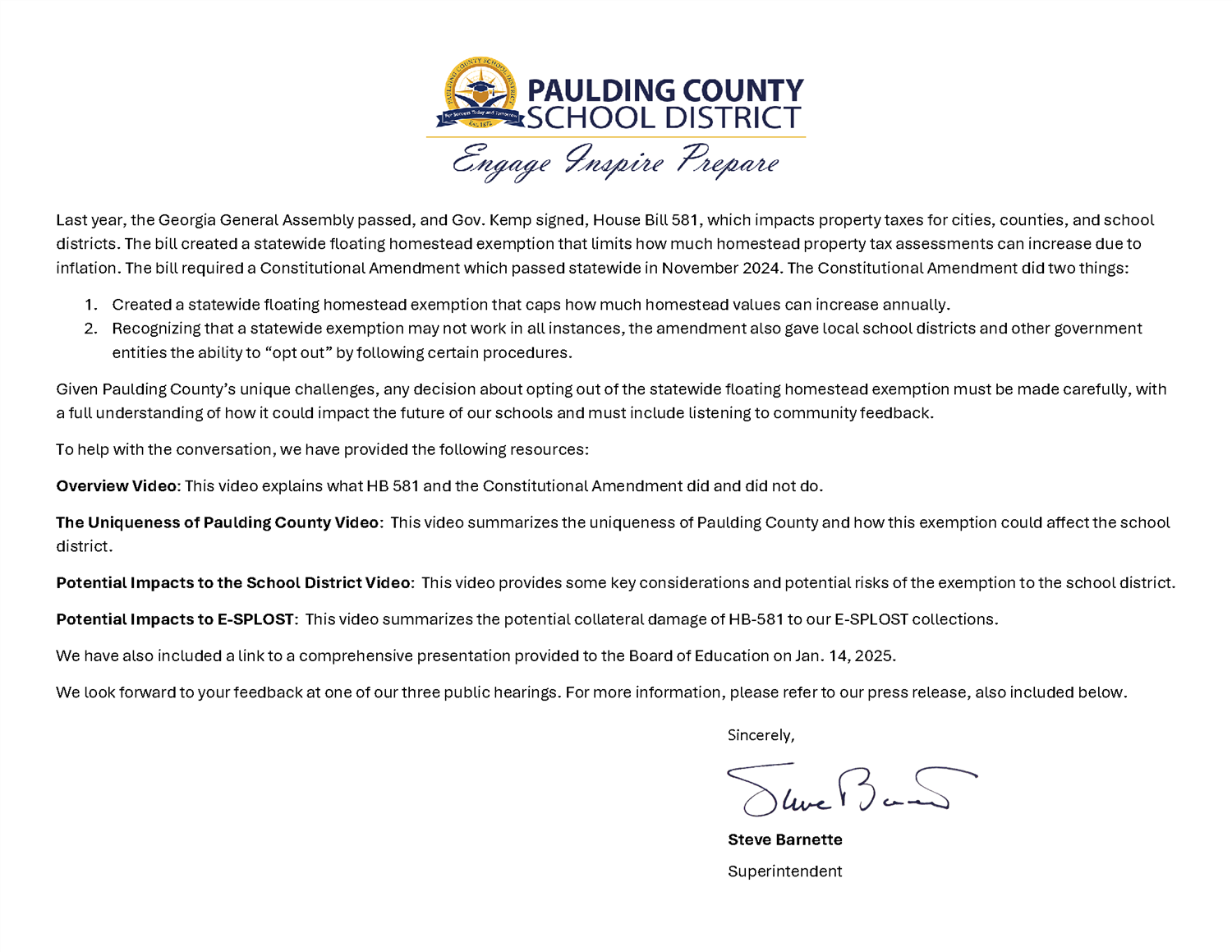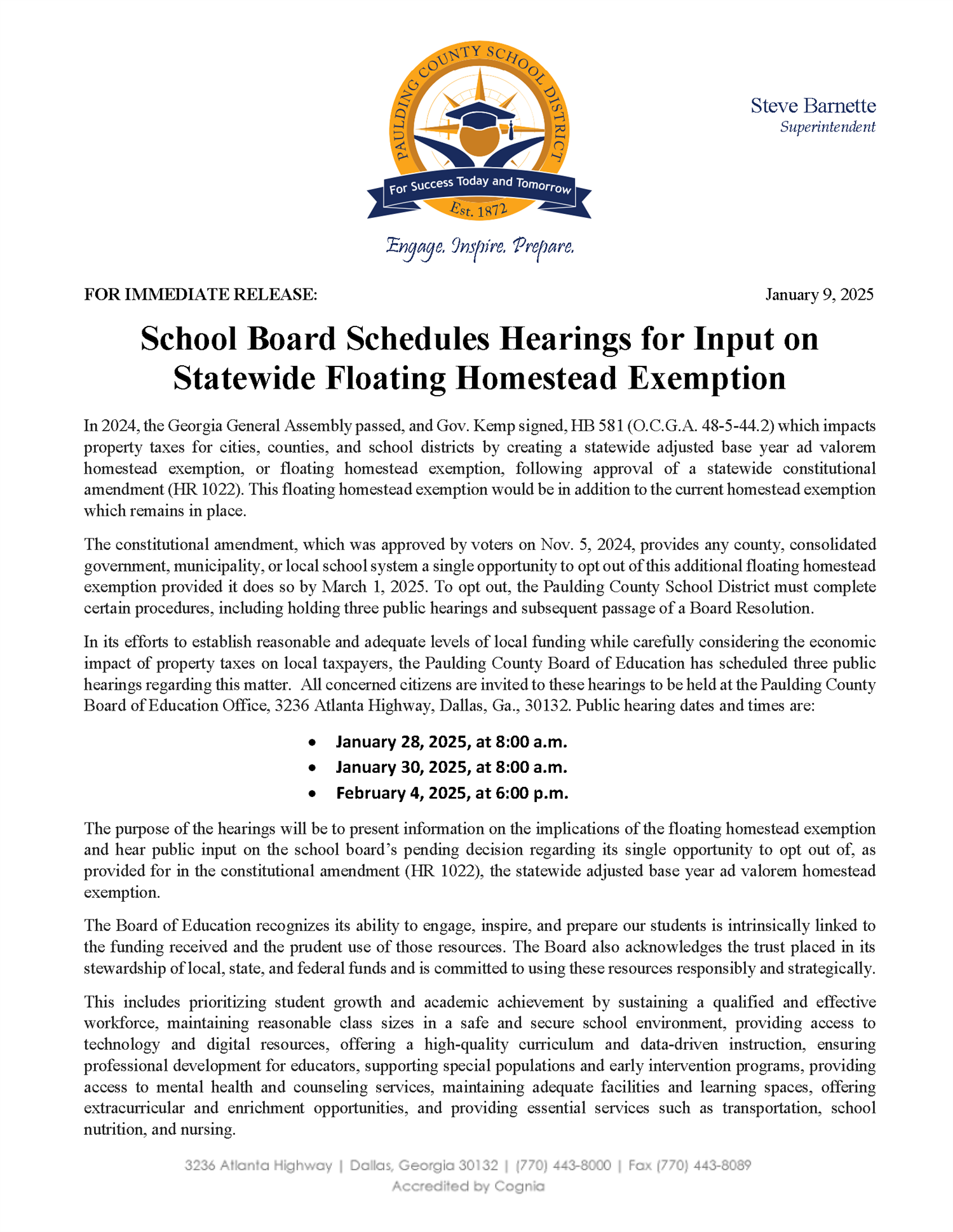Communications
Page Navigation
- Overview
- PCSD Newsletters & Releases
- Emergency Messaging
- Inclement Weather & School Closing
- Community Engagement
- Social Media Community Guidelines
- It's No Joke | Video Series
- Connect With Us
- Meet Our Team
- Project Inquiry Request
- 2023-2024 Communications Audit
- HB 581
- Annual Report
- Communications Plan
Information Regarding HB 581 Floating Homestead Exemption
Important Links
-
County Tax Appraiser Information Regarding HB 581
The Paulding County Tax Appraiser has compiled a comprehensive list of questions and answers related to the HB 581 Floating Homestead Exemption.
-
Public Hearings PowerPoint Presentation
Click here to view the PowerPoint presentation shown at the HB 581 public hearings.
HB-581 Floating Homestead Exemption Videos
-
HB-581 Overview
Why Paulding County is Unique
Potential Impacts of HB-581
Local Option Sales Tax (LOST)
Board of Education HB 581 Presentation - Jan. 14, 2025
(Skip to 1:08:30)
Frequently Asked Questions
-
Will existing homestead exemptions, including the senior exemption, be affected?
Posted by:No, the House Bill 581 Floating Homestead Exemption that was on the ballot in November 2024 is a separate statewide exemption from existing homestead exemptions. The school board opting out of the HB 581 Floating Homestead Exemption, has no effect on existing exemptions, including the senior exemptions already approved and enacted by the school board.
Unfortunately, the advertisement the school district was required to post contains potentially confusing language. The advertisement reads “OPT OUT OF HOMESTEAD EXEMPTION”. That does not mean ALL homestead exemptions, only the HB 581 Floating Homestead Exemption that was on the ballot in November 2024. Existing homestead exemptions are NOT impacted by the Board of Education deciding to “opt out”. This specific language was required by the law and was not the school district's choice.
-
Why do I pay school taxes if I no longer have kids in school?
Posted by:If your children attended public schools, the cost likely was subsidized by other taxpayers, including residential and non-residential property owners. Think of it like roads, police, or fire departments—you may not use them every day, but they exist for everyone's benefit.
Good schools help create a well-educated workforce, which attracts businesses and improves the economy. A strong school system helps keep crime rates lower and property values higher, benefiting all residents.
Areas with good schools often have higher property values, meaning your home is worth more because people want to live in a community with strong schools.
-
Would the new homestead exemption disproportionately affect Paulding County? Why?
Posted by:There are several unique characteristics of Paulding County's economy that would mean the new floating homestead exemption could have a more significant financial impact on our schools.
Fast Growth: Paulding County is one of Georgia’s fastest-growing school districts (8th fastest-growing large district, 11th largest overall). The new floating homestead exemption would place a cap on property valuation increases limited to a percentage determined by the state - most likely the statewide inflation rate. In counties such as Paulding where the enrollment growth rate might exceed the statewide inflation rate, the floating homestead exemption would make it difficult for those school districts to provide the educational services needed to match new growth.
Limited Commercial Tax Base: Only 14 percent of Paulding County’s tax digest comes from commercial properties, compared to an average of 35 percent in neighboring communities.
Unbalanced Tax Base: Unlike neighboring communities such as Bartow County, which has a near-balanced digest (52 percent residential, 48 percent commercial) and Cobb County (70 percent residential, 30 percent commercial), Paulding County’s tax digest has become increasingly unbalanced, shifting from 80 percent residential five years ago to 86 percent residential today.
Greater Dependence on Local Revenue: In Fiscal Year 2019, 30 percent of Paulding County’s revenue came from local sources; today, that number is 38 percent, despite having fewer options to increase funding.
-
How does this new exemption impact local schools?
Posted by:Paulding County relies heavily on residential property taxes (in Paulding 86 percent of the tax digest is residential and just 14 percent commercial, compared to an average of 65 percent residential and 35 percent commercial in neighboring districts). The Board of Education cannot adjust home values, control residential growth, or change the county's limited commercial tax base. Since the new exemption caps taxable values, it could disproportionately impact school districts that are growing at a faster rate than the cap limit. Paulding County is the 11th-largest school district in Georgia and has seen a 7.1 percent enrollment increase over the previous five years, so the exemption could create a long-term funding challenge.
The new exemption also would reduce PCSD's capacity to fund local initiatives that support our students and staff, making it more difficult to address critical or emerging needs without relying on additional state or federal assistance. Two examples:
· The school district has spent approximately $12 million LOCALLY on Safety & Security over the last three years. The state funded $1.5 million during the same period, in addition to one-time security grants.
· Another example of a locally funded initiative is compensation. To maintain the most skilled and qualified workforce possible, the district must remain competitive in compensation.
-
Is this a permanent decision? Can the school board opt in/out at some point in the future?
Posted by:According to the law, the Board of Education has a one-time opportunity to opt out, with a deadline between January 1, 2025 and March 1, 2025. If the school district does not opt out, future school boards cannot revisit this decision. The exemption would then be permanent and difficult to modify later.
-
Are there exceptions that would limit the floating homestead exemption?
Posted by:Yes. It is important to note the floating homestead exemption does not account for substantial changes in the property. For example, if a homeowner adds on to the square footage of the house, then the base-year value may be increased, regardless of a limitation. Thereafter, a new base-year value is created and the new value receives the benefit of the exemption.
It is also important to note that this is called a "floating" homestead exemption because property valuations would change year to year (float) based on a state-determined factor such as the statewide inflation rate. This exemption does not stay with the property, nor the property owner, when a change in ownership occurs. If an individual sells their home, the taxable value of that home resets to fair market value for the next owner. Similarly, the individual cannot carry the value of the exemption to their new home.
-
Would opting out of the new homestead exemption impact millage rates?
Posted by:If local revenue does not keep up with school costs, the school board may need to consider a millage rate increase to maintain services. Unlike cities and counties, school boards are limited to a maximum millage rate of 20.00 mills. Paulding County Schools' current millage rate is 17.675 (the lowest rate in 18 years), which leaves little room for increases without a local referendum.
-
Why does the school district have millions in surplus funds?
Posted by:Misinformation continues to spread regarding a "surplus" fund balance. As of June 30, 2024, the Paulding County School District had approximately 1.7 months of fund balance, compared to the statewide average of 3.8 months. Among Georgia’s 180 school districts, PCSD ranked 153rd in available fund balance, despite being the 11th largest school district.
It is also important to note that June is not the district’s lowest fund balance point because the fund balance fluctuates throughout the fiscal year. The fund balance is not technically a “surplus” because the school district draws from the fund balance while it awaits collections from tax receipts in the fall. The fund balance is critical to support operations and payroll throughout the fiscal year. By September, the fund balance is diminished to a level that can sustain only two or three weeks of operations. And the June fund balance is only enough to sustain operations for about three months, until the next property tax collection cycle begins.
This stands in contrast to many other school districts, Georgia State Charter Schools, and the State of Georgia, which maintain significant surplus or reserve funds.
-
What are the long-term financial risks of the new floating homestead exemption for school funding?
Posted by:Creation of a permanent state-controlled exemption: Future Boards of Education would not be able to reverse the decision if funding challenges arise.
Increased Dependence on State Funding: HB 581 could make Paulding County more vulnerable to state funding shortfalls.
Inability to Respond to Economic Downturns: The exemption limits how much property values can recover after a recession, restricting local revenue.
Rising Costs Outpacing Revenue Growth: Expenses like insurance, fuel, school security, and bus purchases are rising faster than inflation, which is what the exemption is tied to.
-
Would the new floating homestead exemption affect the school district's E-SPLOST funding?
Posted by:Yes, there would be an impact. The law approved last November included a provision allowing cities and counties to implement a new Floating Local Option Sales Tax (FLOST) if they choose to opt in to the new floating homestead exemption and local voters approve. So, while property value increases would be capped for our cities and county, the local sales tax would increase by one cent if voters approve. The law states, however, that collections from a FLOST would be available only to city and county governments, but would not be available to school districts. If a FLOST is passed by Paulding County voters, the local sales tax would increase by one cent. The increased sales tax could incentivize Paulding citizens to shop in other counties with lower sales tax rates. The result could be a reduction in the school district's E-SPLOST collections. Senior citizens (who are fully exempt from property taxes) would still pay the sales tax, effectively subsidizing property tax relief for others.
-
Under HB 581, what happens when a depressed real estate market is recovering, assuming no opt out?
Posted by:The statewide floating homestead exemption is designed to help regulate property tax increases during periods of exceptional growth in property values. However, it could limit or delay the school district’s recovery from economic downturns or a depressed real estate market, as seen during the Great Recession. This might significantly impair the fiscal stability and operations of the school district.
-
Under HB 581, what happens when the real estate market declines, assuming no opt out?
Posted by:As drafted, HB 581 allows for adjustments to the ‘base value’ or ‘adjusted base value’ in only two circumstances:
- Property Changes: The ‘base value’ or ‘adjusted base value’ may decrease if part of the property is removed, sold, damaged, or destroyed after the base has been established.
- Statewide Inflation Index: The State Revenue Commissioner determines an annual statewide inflationary index rate, which accounts for both inflation and deflation. For example, if a home’s ‘base value’ is $300,000 and the inflationary index rate decreases by 2%, the ‘base value’ would adjust to $294,000.
However, in alignment with current practice, the Paulding County Board of Tax Assessors will adjust the ‘base value’ or ‘adjusted base value’ downward if the real estate market declines. However, if the new market value is higher than the existing ‘base value’ or ‘adjusted base value’, the lower value will be maintained.
-
Does the school district receive lottery funds?
Posted by:No, Georgia Lottery funds are primarily used for the HOPE Scholarship & Grant Program and the Georgia Pre-K Program, not K-12 school systems.
-
Doesn’t enrollment growth also bring in more tax revenue?
Posted by:Additional residential housing does increase property tax revenue, but without a more balanced tax digest the revenue does not fully cover the additional costs associated with the increased enrollment.



